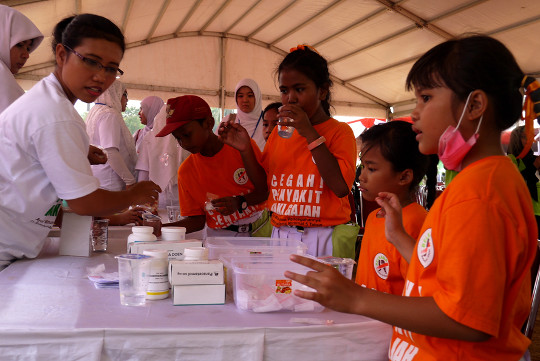- For Print
- October 5, 2015
Eisai Co., Ltd. (Headquarters: Tokyo, CEO: Haruo Naito, “Eisai”) announced today that it has provided 151 million 100 mg tablets of the lymphatic filariasis treatment diethylcarbamazine citrate (DEC) free of charge for use in mass drug administration (MDA) conducted through the BELKAGA (Bulan Eliminasi Kaki Gajah: Lymphatic Filariasis Elimination Month) campaign being promoted by the Government of Indonesia.
Lymphatic filariasis, commonly known as elephantiasis, is a parasitic disease that is transmitted to humans by the bite of a mosquito. Once transmitted, it can cause lymphatic dysfunction which leads to pain as well as serious physical damage of disfigurement to parts of the body associated with lymphedema and other edemas. Currently, an estimated 120 million people are already affected and more than 1.3 billion people worldwide are at risk of this disease. There are over 100 million people at risk of infection in Indonesia alone, which makes Indonesia the region with the second biggest population at risk after India.
The Government of Indonesia views the elimination of lymphatic filariasis as an important policy issue, and in order to achieve elimination of the disease by 2020, declared October to be Lymphatic Filariasis Elimination Month from this year onward, during which they have decided to raise national awareness of the disease and conduct MDA on a national level in cooperation with the World Health Organization (WHO). At an event to mark the beginning of BELKAGA held on October 1 in Bogor, West Java, and MDA was conducted at the same time.
While there are three types of antiparasitic agents that can be used in MDA for lymphatic filariasis, global difficulties in obtaining a stable supply of high quality DEC tablets, one of these antiparasitic agents, has been a major limiting factor in the elimination of this debilitating disease. Eisai conducted development of its own formulation of DEC at its Vizag Plant in India, and submitted a prequalification program dossier to WHO in October 2012. After obtaining prequalification from WHO in August 2013, Eisai subsequently commenced supply of DEC tablets within the same month. Eisai continues to supply DEC tablets free of charge to people at risk in endemic countries in line with WHO's MDA programs until 2020.
Based on its corporate philosophy of human health care (hhc), Eisai is committed to improve access to medicines by taking proactive measures to help solve global health issues including neglected tropical diseases, and contribute to further increasing the benefits provided to patients and their families worldwide.
<Notes to editors>
1. About BELKAGA (Bulan Eliminasi Kaki Gajah: Lymphatic Filariasis Elimination Month)
In Indonesia, many areas are endemic to lymphatic filariasis, and with approximately 40% of the population of over 100 million people at risk of infection, national-level measures are required. In 2014, the Government of Indonesia found that the number of patients was approximately 15,000 at the time. The Government of Indonesia views the elimination of lymphatic filariasis as an important policy issue, and in order to achieve elimination of the disease by 2020, declared October to be Lymphatic Filariasis Elimination Month (BELKAGA), during which they have decided to raise national awareness of the disease and conduct Mass Drug Administration (MDA) on a national level in cooperation with WHO. This year, people at risk of infection living in 195 regions across Indonesia will undergo MDA during the BELKAGA campaign. This MDA requires a large volume of high quality DEC tablets, and Eisai has provided the amount required (151 million tablets) free of charge for 2015. For the next five years (including this year), MDA is scheduled to take place every October on a national level.
On October 1, an event was held by the Government of Indonesia to commemorate BELKAGA in Bogor, West Java, and MDA was conducted at the same time.

2. About Lymphatic Filariasis
Lymphatic filariasis is a parasitic disease that is transmitted to humans by the bite of a mosquito. Once transmitted, it can cause lymphatic dysfunction which leads to pain as well as serious physical damage of disfigurement to parts of the body associated with lymphedema and other edemas. Today, lymphatic filariasis affects an estimated 120 million people worldwide, most of whom live in developing and emerging nations in Africa, Southeast Asia and other regions. In Japan, the disease has been confirmed to have existed since the Heian period (794-1184), but was successfully eliminated in the late 1970s as a result of initiatives begun roughly ten years earlier by the Japanese government in partnership with the public-private sector, with Japan then becoming the first country in the world to demonstrate the successful achievement of lymphatic filariasis elimination.
For further details on lymphatic filariasis and Eisai's access to medicines initiatives, please visit the ”Eisai ATM Navigator“ website (http://atm.eisai.co.jp/english).
